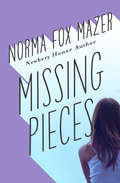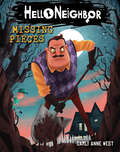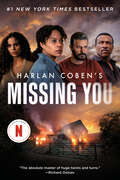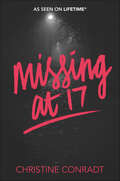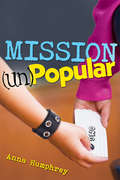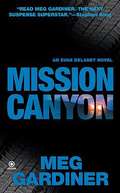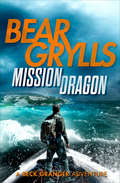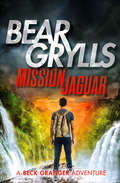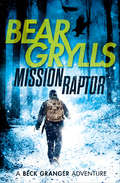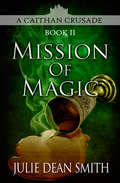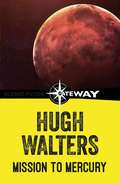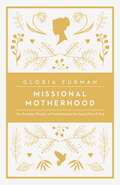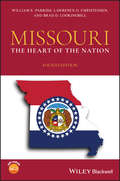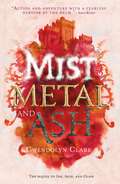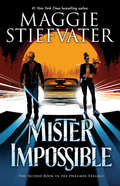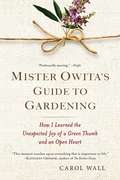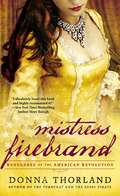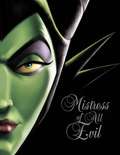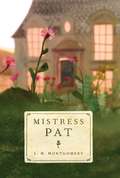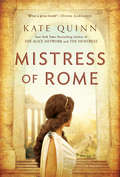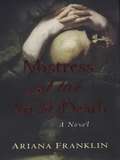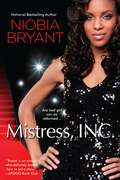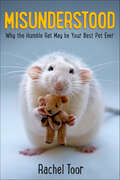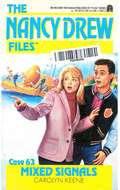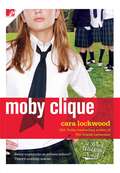- Table View
- List View
Missing Pieces
by Norma Fox MazerJessie's father has always been a missing piece of her life--but if she were to find him, how would he feel about her? Jessie Wells thinks four is a good number. Things with four sides are sturdy and strong. A box, a chair, a room with four walls. But ever since the day Jessie's dad left, Jessie, her mother, and Aunt Zis have been a triangle--three-sided, though solidly linked. Jessie has heard the story: Her beautiful young mother had married a prince who disappeared one day, so she had raised her daughter with the help of Aunt Zis. But lately, the picture in Jessie's mind seems incomplete. Who is James Wells? she wonders. He must be more than just a deadbeat dad who deserted his wife and child, and Jessie is determined to find out, even if she has to call every Wells in the phone book--and there are a lot of them. But if Jessie finds her father and asks him all her questions, will she like the answers?
Missing Pieces: An AFK Book (Hello Neighbor #1)
by Carly Anne WestLock your doors! From the creators of the blockbuster horror video game Hello Neighbor comes the story that started it all. Unravel the mystery in this gripping prequel novel!Nicky Roth has always been a lonely kid. But that all changes when he and his family move to Raven Brooks and meet their eccentric neighbors, the Petersons. Nicky befriends the Petersons' son, Aaron, bonding over their talents for tinkering. Soon the boys are inseparable and using their skills to pull pranks on the townspeople. But something about Aaron bothers Nicky--people seem almost afraid of him and his family. Through snippets from Aaron and a lot of sleuthing in the town's archives, Nicky discovers a dark past haunting his neighbors, a streak of bad luck they can't seem to shake. Aaron thinks that's all behind them now, but Nicky has a feeling the Petersons are fated for another tragedy. . . . This pulse-pounding prequel novel to the hit video game Hello Neighbor includes two-color illustrations throughout, to help readers unwind the mystery at the heart of the game.
Missing You
by Harlan CobenFrom #1 New York Times bestselling author Harlan Coben, a heart-pounding thriller about the ties we have to our past...and the lies that bind us together. It's a profile, like all the others on the online dating site. But as NYPD Detective Kat Donovan focuses on the accompanying picture, she feels her whole world explode, as emotions she's ignored for decades come crashing down on her. Staring back at her is her ex-fiancé Jeff, the man who shattered her heart--and who she hasn't seen in 18 years.Kat feels a spark, wondering if this might be the moment when past tragedies recede and a new world opens up to her. But when she reaches out to the man in the profile, her reawakened hope quickly darkens into suspicion and then terror as an unspeakable conspiracy comes to light, in which monsters prey upon the most vulnerable. As the body count mounts and Kat's hope for a second chance with Jeff grows more and more elusive, she is consumed by an investigation that challenges her feelings about everyone she ever loved--her former fiancé, her mother, and even her father, whose cruel murder so long ago has never been fully explained. With lives on the line, including her own, Kat must venture deeper into the darkness than she ever has before, and discover if she has the strength to survive what she finds there.
Missing at 17 (At 17 #1)
by Christine ConradtIn this suspenseful and romantic teen thriller based on the “can’t pull your eyes away” series on Lifetime, one girl discovers that no matter how far you run from your problems, they will always find you.For most of Candace’s life she never felt like she completely belonged. But nothing could prepare her for the shocking discovery that her parents have been concealing the truth about who she is and where she came from her entire life.Feeling like her world has been turned upside down, and unable to trust the people she’s closest to, Candace runs away...right into the arms of an alluring stranger.But while Candace and Toby have an undeniable connection, it's less certain what the future holds for them as Candace’s family and Toby’s less-than-legal lifestyle threaten to rip them apart.As things start to spiral out of control, Candace must fight to understand her own identity...and who she can truly rely on.
Mission (Un)Popular
by Anna HumphreyEasier said than done. But, if Margot can learn to control her big mouth (and hair), there is hope. The new girl, Em, from New York, needs a friend too, now that the popular girls have decided she's "weird." More accurately, Em is "intimidating." She dresses like a rock star and doesn't seem to care what anyone thinks of her???especially Sarah J., the most popular girl in the seventh grade. Em has an agenda for change at Manning Middle School and wants Margot on her side.
Mission Canyon
by Meg GardinerEvan Delaney, novelist and legal go-fer, is dressed as Diana Ross in order to crash a fancy-dress party and serve a summons, when she hears that Franklin Brand is back in town. Brand is the hit-and-run driver who sentenced Evan's lover Jesse to life in a wheelchair, and killed his best friend. Since the accident, Brand has been avoiding justice overseas; but if he's back, Evan and Jesse are determined to get him, helped by the dead boy's brother Adam. Brand had been a high-flier in Mako Technologies, a cyber-security firm, and this is where Evan starts looking. She quickly uncovers evidence that Brand was embezzling funds, and that Adam's brother knew all about it. So maybe that hit-and-run wasn't an accident at all?Then the policeman investigating is killed, and Adam and Jesse both come under suspicion. The plot has more twists, thrills and spills than a white-knuckle ride, and is complicated by the confused emotions of the main parties involved: Jesse feels a survivor's guilt; Adam resents the fact that Jesse is alive while his brother died. But there are more corpses - including a near miss for Evan herself - to come before the bad guys are finally brought to book.
Mission Dragon (The Beck Granger Adeventures #2)
by Bear GryllsTwo young shipwreck survivors face lethal threats in this thriller from the host of Running Wild with Bear Grylls. Teenager Beck Granger and his fellow adventurer Li Ju-Long are shipwrecked in the South China Sea and must fight not only for their survival, but for their injured friend, Jian. Washed ashore on an archipelago, they must find food, water, and shelter before night falls on the deserted island. Deserted, that is, apart from a group of large, carnivorous lizards . . . From the bestselling author, former British Special Forces soldier, and world-famous survival expert known as an “intrepid, insatiable explorer,” this is an edge-of-your seat story of a battle to survive on unforgiving terrain (Kirkus Reviews).
Mission Jaguar (The Beck Granger Adeventures #4)
by Bear GryllsIn Guatemala, a land of ancient civilizations and treacherous jungles, a young adventurer searches for his long-lost sister . . . Beck finally has the information needed to help him track down his long-lost sister, Dian, but his survival skills will be tested to the extreme as he attempts to find her home in a remote corner of the Guatemalan jungle. With the help of his friend James, Beck must navigate underwater caves, sheer falls, and jaguars lurking in the darkness . . . But does Dian even want to be found? This is a thrilling novel of adventure by the “intrepid, insatiable explorer” famous for the TV show Running Wild with Bear Grylls (Kirkus Reviews).
Mission Raptor (The Beck Granger Adeventures #3)
by Bear GryllsIn the bitter arctic cold, a young adventurer feels the heat as criminals close in . . . Teenager Beck Granger is north of the Arctic Circle, and a harsh Swedish winter is closing in. He is enjoying a break from adventure, working with environmental action group Green Force—until a chance encounter with an old family acquaintance changes everything. Beck is thrust in the path of a band of criminals that will stop at nothing to keep their secret safe. A secret that, if revealed, could change Beck’s life forever. Beck’s survival skills are put to the ultimate test as he is forced to flee through the arctic wilderness. The enemy remains unknown, but their goal is clear: they want Beck dead—in this thrilling novel by the host of Running Wild with Bear Grylls.
Mission of Magic (The Caithan Crusades #2)
by Julie Dean SmithA princess must learn to wield her own magic if she is to save her kingdom—and her own life—from the cruel reign of her brother in this fantasy saga.Princess Athaya of Caithe paid dearly for revealing her magical gifts: the loss of loved ones, excommunication from the Church, and a death warrant on her head. She barely escaped the kingdom of Caithe with her life, and yet she is already plotting her return.Despite months of grueling instruction, Athaya is only beginning to grasp the full extent of her talents. Her battle-magic is still unpredictable and her spell path-maps are incomplete. But Athaya is running out of time. While she’s been away training, the Lorngeld continue to suffer under the reign of her brother Durek.Athaya swore she’d abolish the Church’s murderous rite of absolution and legalize the teaching of magic to the Lorngeld. But fulfilling those promises won’t be easy. Though Athaya is aided by a powerful group of wizards, her brother will not rest until she is defeated.
Mission to Mercury
by Hugh WaltersThe four intrepid astronauts, headed by Chris Godfrey, look forward with enthusiasm to their trip to Mercury until the new crew member turns out to be a girl! Gail Patrick is being sent along to test mental telepathy as a means of communication. Her twin sister, Gill, will remain in the control room on earth to receive and send messages into space.
Missional Motherhood: The Everyday Ministry Of Motherhood In The Grand Plan Of God (The\gospel Coalition Ser.)
by Gloria FurmanThere's no such thing as “just” a mom. Despite the routine tasks and mundane to-do lists, motherhood is anything but insignificant. God has designed motherhood as part of his greater plan to draw people to himself—instilling all women, whether called to traditional mothering or not, with an eternal purpose in nurturing others. In this book, Gloria Furman searches the Scriptures for the mission of God in motherhood. She opens our eyes to God's life-giving promises—promises intended to empower each and every woman as she makes disciples in her home, in her neighborhood, and around the world.
Missouri: The Heart of the Nation (Missouri Biography Ser. #1)
by Brad D. Lookingbill William E. Parrish Lawrence O. ChristensenComprehensively captures the robust history of the state of Missouri, from the pre-Columbian period to the present Combining a chronological overview with topical development, this book by a team of esteemed historians presents the rich and varied history of Missouri, a state that has played a pivotal role in the history of the nation. In a clear, engaging style that all students of Missouri history are certain to enjoy, the authors of Missouri: The Heart of the Nation explore such topics as Missouri’s indigenous population, French and Spanish colonialism, territorial growth, statehood, slavery, the Civil War and Reconstruction, railroads, modernization, two world wars, constitutional change, Civil Rights, political realignments, and the difficult choices that Missourians face in the 21st century. Featuring chapter revisions as well as new maps, photographs, reading lists, a preface, and index, this latest edition of this beloved survey textbook will continue to engage all those celebrating Missouri’s bicentennial. A companion website features a student study guide. Published to commemorate the bicentennial of Missouri statehood in 2021 Features fully updated chapters that bring the historical narrative up to the present Presents numerous images and maps that enrich the coverage of key events Provides suggestions for further reading Missouri: The Heart of the Nation is an excellent book for colleges and universities offering survey courses on state history or state government. It also will appeal to all lovers of American history and to those who call Missouri home.
Mist, Metal, and Ash (Ink, Iron, and Glass #2)
by Gwendolyn ClareWorlds collide in this thrilling sequel to the epic, imaginative, acclaimed fantasy Ink, Iron, and Glass.In an alternate 19th-century Italy, Elsa has an incredible gift: she can craft new worlds with precise lines of script written in books. But political extremists have stolen the most dangerous book ever scribed—one that can rewrite the Earth itself. Now Elsa must track down the friend who betrayed her and recover the book before its destructive power is unleashed. Can she handle the secrets she’ll uncover along the way—including the ones hiding in her own heart?An Imprint Book"The alternate-history thrill ride continues... The author is a master of character development... Action and adventure with a fearless heroine at the helm." —Kirkus ReviewsPRAISE FOR INK, IRON, AND GLASS:“This novel is a source of serious fun.” —School and Library Journal (starred review)“Exciting and original.” —Kirkus (starred review)“Clare’s debut is built upon an intriguing premise... A solid series starter featuring a competent, flawed heroine that’s built for sf fans.” —Booklist“A gasp-worthy ending ensures a sequel.” — Bulletin of the Center for Children’s Books
Mister Impossible (The Dreamer Trilogy #2)
by Maggie StiefvaterFrom the #1 New York Times bestselling author of The Raven Boys, a mesmerizing story of dreams and desires, death and destiny.Something is happening to the source of the dreamers' power. It is blocked. Diminished. Weak. If it goes away entirely, what will happen to the dreamers and those who depend on them?Ronan Lynch isn't planning to wait and find out. Backed by his mentor, Bryde, he is ready to do what needs to be done to save the dreamers and the dreamed . . . even if it takes him far from his family and the boy he loves.Jordan Hennessy knows she will not survive if the dreaming fails. So she plunges into a dark underworld in order to find an object that may sustain her.Carmen Farooq-Lane is afraid of the dreamers -- which is why she's agreed to hunt them down. The closer she gets, though, the more complicated her feelings become. Will the dreamers destroy the world . . . or will the world be destroyed trying to eliminate the dreamers?In the remarkable second book of The Dreamer Trilogy, Maggie Stiefvater pushes her characters to their limits -- and shows what happens when they start to break.
Mister Owita's Guide to Gardening
by Carol Wall"In this profoundly moving memoir, Owita teaches Wall how to find grace amid heartbreak and to accept that beauty exists because it is fleeting--as in her garden, as in life." --People, 4 stars"A perfect spring awakening." --Good HousekeepingA true story of a unique friendship between two people who had nothing--and ultimately everything--in common.Carol Wall, a white woman living in a lily-white neighborhood in Middle America, was at a crossroads in her life. Her children were grown; she had successfully overcome illness; her beloved parents were getting older. One day she notices a dark-skinned African man tending her neighbor's yard. His name is Giles Owita. He bags groceries at the supermarket. He comes from Kenya. And he's very good at gardening. Before long Giles is transforming not only Carol's yard, but her life. Though they are seemingly quite different, a caring bond grows between them. But they both hold long-buried secrets that, when revealed, will cement their friendship forever.er.
Mistress Firebrand
by Donna ThorlandBritish Occupied Manhattan, 1777. With her witty comedies, American actress Jennifer Leighton has been packing the John Street Theater, but she longs to escape the provincial circuit for the glamour of the London stage. When the playwright General John Burgoyne visits the city, fresh from a recent success in the capitol, she seizes the opportunity to court his patronage. But her plan is foiled by British intelligence officer Severin Devere. Severin's mission is to keep the pleasure-loving general focused on the war effort...and away from pretty young actresses. But the tables are turned when Severin himself can't resist Jennifer Leighton...Months later, Jenny has abandoned her dreams of stage glory and begun writing seditious plays for the Rebels under the pen name "Cornelia," ridiculing "Gentleman Johnny" Burgoyne and his army--and undermining the crown's campaign to take Albany. By the time Severin meets up with Jenny once again, she is on a British hanging list, and Severin is ordered to find her--and deliver her to certain death. Soon, the two are launched on a desperate journey through the wilderness, toward a future shaped by the revolution--and their passion for each other...READERS GUIDE INCLUDED
Mistress Of All Evil (Villains #4)
by Serena ValentinoThe tale is told as if it's happening once upon a dream: the lovely maiden meets her handsome prince in the woods. The story has been told many times and in many ways. But always the maiden finds out that she is a princess-a princess who has been cursed by a dark fairy to prick her finger on a spindle and fall into an eternal sleep. Though her three good fairies try to protect her, the princess succumbs to the curse. But the power of good endures, as her true love defeats the fire-breathing dragon and awakens the princess with true love's first kiss. The two live happily ever after. <p><p> And yet this is only half the story. So what of the dark fairy, Maleficent? Why does she curse the innocent princess? What led to her becoming so filled with malice, anger, and hatred? Many tales have tried to explain her motives. Here is one account, pulled down from the many passed down through the ages. It is a tale of love and betrayal, of magic and reveries. It is a tale of the Mistress of All Evil.
Mistress Pat
by L. M. MontgomeryThe definitive paperback editions of L.M. Montgomery's beloved novels get a brand-new look for the next hundred years!When she was twenty, nearly everyone thought Patricia Gardiner ought to be having beaus--except, of course, Pat herself. For Pat, Silver Bush was both home and heaven. All she could ever ask of life was bound in the magic of the lovely old house on Prince Edward Island, "where good things never change." And now there was more than ever to do, what with planning for the Christmas family reunion, entertaining a countess, playing matchmaker, and preparing for the arrival of the new hired man. Yet as those she loved so dearly started to move away, Pat began to question the wisdom of her choice of Silver Bush over romance. Was it possible to be lonely at Silver Bush?
Mistress of Rome (Empress of Rome #1)
by Kate QuinnThe first gripping historical fiction novel in national bestselling author Kate Quinn's Empress of Rome saga. First-century Rome: a world of depravity, blood, and secrets. The ruthless and enigmatic Emperor Domitian watches over all—and fixes his gaze on one humble young woman…. Thea is a slave girl from Judaea, purchased as a toy for the spiteful heiress Lepida Pollia. Now she has infuriated her mistress by capturing the attention of Rome’s newest and most savage gladiator—and though his love brings Thea the first happiness of her life, their affair ends quickly when a jealous Lepida tears them apart. Remaking herself as a singer for Rome’s aristocrats, Thea unwittingly attracts another admirer: the charismatic Emperor of Rome. But the passions of an all-powerful man come with a heavy price, and Thea finds herself fighting for both her soul and her sanity. Many have tried to destroy the Emperor: a vengeful gladiator, an upright senator, a tormented soldier, a Vestal Virgin. But in the end, the life of Domitian lies in the hands of one woman: the Emperor’s mistress.From the Paperback edition.
Mistress of the Art of Death (A Mistress of the Art of Death Novel #1)
by Ariana FranklinA chilling, mesmerizing novel that combines the best of modern forensic thrillers with the detail and drama of historical fiction. In medieval Cambridge, England, four children have been murdered. The crimes are immediately blamed on the town's Jewish community, taken as evidence that Jews sacrifice Christian children in blasphemous ceremonies. To save them from the rioting mob, the king places the Cambridge Jews under his protection and hides them in a castle fortress. King Henry I is no friend of the Jews-or anyone, really-but he is invested in their fate. Without the taxes received from Jewish merchants, his treasuries would go bankrupt. Hoping scientific investigation will exonerate the Jews, Henry calls on his cousin the King of Sicily-whose subjects include the best medical experts in Europe-and asks for his finest "master of the art of death," an early version of the medical examiner. The Italian doctor chosen for the task is a young prodigy from the University of Salerno. But her name is Adelia-the king has been sent a mistress of the art of death. Adelia and her companions-Simon, a Jew, and Mansur, a Moor-travel to England to unravel the mystery of the Cambridge murders, which turn out to be the work of a serial killer, most likely one who has been on Crusade with the king. In a backward and superstitious country like England, Adelia must conceal her true identity as a doctor in order to avoid accusations of witchcraft. Along the way, she is assisted by Sir Rowley Picot, one of the king's tax collectors, a man with a personal stake in the investigation. Rowley may be a needed friend, or the fiend for whom they are searching. As Adelia's investigation takes her into Cambridge's shadowy river paths and behind the closed doors of its churches and nunneries, the hunt intensifies and the killer prepares to strike again...
Mistress, Inc. (Mistress Series #3)
by Niobia BryantThe other woman finds herself embroiled in scandal—and in the spotlight—in a novel that &“enthralls to the last twist&” by the national bestselling author (RT Book Reviews).When Jessa Bell revealed she was having an affair with one of her best friends&’ husbands, no one would have predicted she&’d soon be playing the part of the reformed mistress—least of all Jessa. But her experience—and ensuing remorse—has landed her on all the national talk shows and scored her a major book deal. Now that she&’s pregnant with her ex-lover&’s baby, Jessa&’s determined to cash in on all the attention. Trouble is, she&’s not feeling much genuine regret.Shunned by her former friends, Jessa is still being propositioned by married men—and decides to start a business to help wives catch their cheating husbands. But when more secrets about her past are exposed, it&’s going to be tough for her to stay on the straight and narrow—even if it spells disaster for her future . . .&“Full of scandal, lies, secrets, sex, and redemption.&” —aPOOO Book Club
Misunderstood: Why the Humble Rat May Be Your Best Pet Ever
by Rachel ToorAs much a moving memoir as it is an amusing pet manual, Misunderstood is a unique nonfiction book for teens and tweens about domesticated rats in general and a wonderful rat named Iris in particular. Brimming with smarts and energy just like its furry subjects, Rachel Toor's text blends history and science with profiles of interesting people and autobiographical anecdotes as it joyfully sets the record straight about why this reviled creature is actually a most amazing species. Readers will come away with a deeper understanding and appreciation of domestic rats—and may be convinced to adopt one themselves.
Mixed Signals (Nancy Drew Files #63)
by Carolyn KeeneNancy has joined Ned on campus for Emerson College’s homecoming weekend, and that means pep rallies, parades, and, of course, the annual gridiron clash with archrival Russell University. But when danger takes the field, the cheers turn to tears—because winning is crucial when a player’s life is on the line.
Moby Clique (The Bard Academy #No. 3)
by Cara LockwoodSome literary classics have been around for centuries. Miranda Tate's just hoping to survive junior year.... Her summer reading assignment is Moby-Dick, but Miranda's vacation hasn't exactly been smooth sailing. Between working at her stepmother's hideous all-pink boutique, and having broken up with her basketball champ boyfriend Ryan, not to mention snoozing her way through one of literature's heaviest tomes, she's almost looking forward to returning to Bard Academy. That was before her kid sister Lindsay smashed up their dad's Land Rover and got shipped off to Bard herself. Is the punishment Lindsay's -- or Miranda's? A private school staffed by the ghosts of famous dead writers is hard enough to navigate without a freshman kid sister in tow, but now Miranda's trying to sort out her feelings for her brooding friend Heathcliff, who happens to be a fictional character, while keeping Bard's secrets from her nosy sister. And when her nemesis Parker handpicks gullible Lindsay to be a Parker clone, Miranda knows a storm is brewing. Then, Lindsay disappears in the woods...and a frantic search sends Ryan, Miranda, and Heathcliff to Whale Cove, a spot rumored to hide a sunken pirate's ship. But something -- or someone -- even more ominous and terrifying lurks there. Can Miranda stay the course and save her sister?
